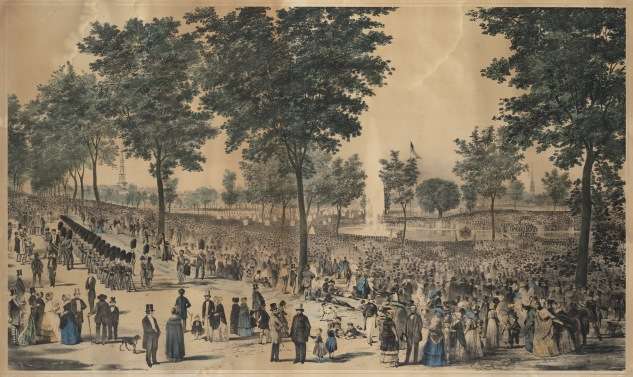“Leave to dig up a portion of Boston Common”
On 28 Sept 1852, the Boston Herald reported on the meeting of the Boston City Council. The very last petition taken up, at the end of a long paragraph, was:
John Griffin for leave to dig up a portion of Boston Common for the purpose of finding hidden treasure, buried there by his father in 1837.That was inaccurate. On the same morning the Boston Post revealed that the treasure Griffin sought went all the way back to the Revolution.
The Boston Post article was widely quoted and paraphrased, as in this item from the Daily Evening Transcript for that date:
Treasure Buried on Boston Common. A Mr. John Griffin petitioned the city government yesterday for permission to dig a hole on Boston Common, six feet in diameter, for the purpose of obtaining $1000 which he asserts his father, John Griffin, who served in the army in the war of the Revolution, secreted during the “troubled times” preceding said war. Griffin says he is poor and wants the money bad. The petition was referred to the committee on the common.One of those newspapers caught the eye of Jonathan Hill, as he described for the Vita Brevis blog of the New England Historic Genealogical Society last month. Folks at the Boston City Archives found Griffin’s petition, which specified that his namesake father had died in Nottingham, New Hampshire, in 1837.
Griffin also promised that his father had given him “full directions and measurements from standing monuments” to the burial spot, which was “seated in a path on the said Common,” so a dig wouldn’t disturb the trees or turf. (It would, of course, disrupt pedestrian traffic along that path.)
John Griffin didn’t uncover that treasure, however. The council’s committee rejected his request. No one has yet found further newspaper reports on Griffin, either supporting his request or critiquing it as a con or a delusion. The Post story was reprinted in New Hampshire, where people might have had a different perspective on Griffin, but I didn’t find any followup.
Using census records, Hill found a John Griffin living in Nottingham and then in Orleans County, Vermont, whose family details match the petitioner’s claim. He was very poor until his death twenty years after his petition.
Hill wasn’t able to find corroboration for Griffin’s story about his father. There’s no surviving record of a senior John Griffin dying in Nottingham in 1837. Several John Griffins served in the Continental forces, including a handful from New Hampshire, but there’s not enough detail to connect any of this story.
The lack of evidence in U.S. pension files seems significant. If the elder John Griffin was a Continental Army veteran who survived until 1837, then he had the opportunity to apply for a federal pension, but no John Griffin did.
Finally, there are logical questions about Griffin’s story. In “troubled times,” wouldn’t $1,000 be even more useful to keep around instead of burying? Wouldn’t it be safer to hide treasure on private property rather than a path on the common, where any burying would be publicly visible and many people might go over or dig in the ground?
Of course, if this were a short story, the Boston City Councilor who refused to let John Griffin dig just wants the poor man’s treasure for himself. He goes out to the Common late at night with a shovel. With great and unaccustomed effort, the politico excavates the spot where Griffin’s directions led. After a night of blisters and dirt, he unearths a metal box—only to be stopped by the Boston police. The officers are ready to send him home, but he insists on taking the box, arguing his way into an arrest. And when the box is finally opened, it turns out to contain $1,000 in Continental paper money from 1781.


1 comment:
Oh, that'd make for the subject of a good short play, too...
Post a Comment